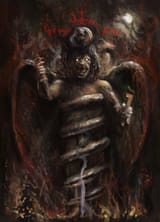Search Results
7/9/2025, 10:43:24 AM
>>509904532
>Though communion with evil spirits was strictly forbidden in the orthodox version of the faith, the accounts of Greek authors accord in many respects with the doctrines of those referred to in the Avesta, and other Zoroastrian literature, as a certain people hostile to the orthodox community, called “sorcerers” or “deava worshippers”, or devil-worshippers. As the Greater Bundahishn criticized, the prime object of worship the false Magi was Ahriman, for “by the religion of the sorcerers (Ahriman) so inclines men to love him and to hate Ahura Mazda that they abandon the cult of Ahura Mazda and practice that of Ahriman.” In essence, through his knowledge of evil, the sorcerer seeks to subdue to the devil to his will, and to force him into his service, or if he is less competent, to appease him with sacrifice and prayers. The earliest reference to the cult in the west of Persia, is an inscription of the emperor Xerxes in which he appears to boast of having destroyed a deava temple
>The worship of Ahriman was partly justified by a heresy created by the Magi, known as Zurvanism, whereby the simple cosmic dualism of two opposing gods was altered into a more subtle sort of dualism. It is according to Zurvanism that Ahriman becomes the lord of this world, the original conception of the devil as the “Prince of this World.” The teachings of Zurvanism however, can only be pieced together from scattered sources, and it is not known at what date precisely they emerged. Dr. I Gershevitch, however, has demonstrated that Zurvan existed as god of Time already by the end of the sixth century BC. Mary Boyce indicated that the heresy seems to have been adopted as the true orthodoxy by the late Achaemenid kings, and their successors the Sassanians
>The first account of Zurvanite doctrine is derived from the fourth century BC, from Eudemus of Rhodes, a pupil of Aristotle, though surviving only through Damascius, a philosopher of the sixth century AD
>Though communion with evil spirits was strictly forbidden in the orthodox version of the faith, the accounts of Greek authors accord in many respects with the doctrines of those referred to in the Avesta, and other Zoroastrian literature, as a certain people hostile to the orthodox community, called “sorcerers” or “deava worshippers”, or devil-worshippers. As the Greater Bundahishn criticized, the prime object of worship the false Magi was Ahriman, for “by the religion of the sorcerers (Ahriman) so inclines men to love him and to hate Ahura Mazda that they abandon the cult of Ahura Mazda and practice that of Ahriman.” In essence, through his knowledge of evil, the sorcerer seeks to subdue to the devil to his will, and to force him into his service, or if he is less competent, to appease him with sacrifice and prayers. The earliest reference to the cult in the west of Persia, is an inscription of the emperor Xerxes in which he appears to boast of having destroyed a deava temple
>The worship of Ahriman was partly justified by a heresy created by the Magi, known as Zurvanism, whereby the simple cosmic dualism of two opposing gods was altered into a more subtle sort of dualism. It is according to Zurvanism that Ahriman becomes the lord of this world, the original conception of the devil as the “Prince of this World.” The teachings of Zurvanism however, can only be pieced together from scattered sources, and it is not known at what date precisely they emerged. Dr. I Gershevitch, however, has demonstrated that Zurvan existed as god of Time already by the end of the sixth century BC. Mary Boyce indicated that the heresy seems to have been adopted as the true orthodoxy by the late Achaemenid kings, and their successors the Sassanians
>The first account of Zurvanite doctrine is derived from the fourth century BC, from Eudemus of Rhodes, a pupil of Aristotle, though surviving only through Damascius, a philosopher of the sixth century AD
Page 1
